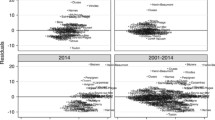Abstract
Electing a Prime Minister (PM) is a process that occurs every 5 years in India, through conducting an election. Who will win the election is one of the most asked questions on everyone’s tongue, as the election is just few months away. The objective of this research is to predict the likelihood of PM Narendra Modi’s chances to continue as the Prime Minister of India using Bayesian network approach. The aim of this research is not to develop a new predictive algorithm, but to use the existing approach for making predictions on a real-life scenario. Our Bayesian modeling is based on public responses available on social media, India statistics, and news articles on the key policies undertaken by PM Narendra Modi during his current tenure. We explore using causal and diagnostic reasoning to find new insights on the factors sha** his win or no-win, verdict on his government strength and weakness. Our Bayesian model reveals that the current Prime Minister Modi has 61.4% chances of winning the upcoming 2019 elections.
Access this chapter
Tax calculation will be finalised at checkout
Purchases are for personal use only
Similar content being viewed by others
References
Zogjani, A., Llaci, S., Elmazi, E.: The role of power in effective leadership and followership: the Albanian Case. Rom. Econ. Bus. Rev. 9(1) (2014)
Tang, Q., Wang, X., Huang, Z., Zheng, S.: Research of student model based on Bayesian Network. In: 2007 First IEEE International Symposium on Information Technologies and Applications in Education, 26 Dec 2007
Awasthi, S., Babbar, S., Predicting ICC Cricket World Cup 2015. Department of Computer Science & Engineering, Jaypee University of Information Technology, Waknaghat, Himachal Pradesh, India, vol. 2, Issue 5 (2015)
Anand. N.: Two years after demonetization, India is still struggling to create jobs. https://qz.com/india/1455596/indias-job-market-is-yet-to-recover-from-modis-demonetisation/, 9 Nov 2018
Liu, S., Wang, X., Liu, M., Zhu, J.: Towards a better analysis of machine learning models: a visual analytics perspective. Visual Inf. 1(1), 48–56 (2017)
Democracy Index 2018, http://www.eiu.com/topic/democracy-index. Last accessed on 18 March 2019
Budget, https://en.wikipedia.org/wiki/2019_interim-Unnion_budget_of_India. Last accessed on 19 Feb 2019
GST, https://en.wikipedia.org/wiki/Goods_and_Services_Tax_(India). Last accessed on 19 Feb 2019
Demonetization, https://en.wikipedia.org/wiki/2016_Indian_banknote_demonetization. Last accessed on 19 Feb 2019
Surgical strikes, https://en.wikipedia.org/wiki/2016_Indian_Line_of_control_strike. Last accessed on 19 Feb 2019
Digitization, https://en.wikipedia.org/wiki/Digital_India. Last accessed on 19 Feb 2019
Subba, Patel, P., Girdhar, R., et al.: Bayes’ Theorem, and operations research. Imperial J. Interdisc. Res. (IJIR) 3(10) (2017). ISSN: 2454-1362. http://www.onlinejournal.in
Singh, A.K., Gupta, D.K., Singh, R.M.: Sentiment analysis of Twitter user data on Punjab Legislative Assembly Election, 2017. Int. J. Mod. Educ. Comput. Sci. 9, 60–68 (2017)
Margaritis, D.: Learning Bayesian network model structure from data. May 2003. https://www.cs.cmu.edu/~dmarg/Papers/PhD-Thesis-Margaritis.pdf
Mega times group poll: 71.9% of Indians say they will vote for Narendra Modi as PM again in 2019. https://timesofindia.indiatimes.com/india/mega-times-group-poll-71-9-of-indians-say-they-will-vote-for-narendra-modi-as-pm-again-in-2019/articleshow. 26 May 2018
Age Structure And Marital Status, http://censusindia.gov.in/Census_And_You/age_structure_and_marital_status.aspx
India in Figures 2018, http://mospi.nic.in/sites/default/files/publication_reports/India_in_figures-2018_rev.pdf
www.twitter.com. Accessed on 9 Feb 2019
Making sense of the Aam Aadmi Party win in the Delhi Elections. https://www.rediff.com/news/report/making-sense-of-the-aam-aadmi-party-win-in-the-delhi-elections/20131223.htm, 24 Dec 2013
Author information
Authors and Affiliations
Corresponding author
Editor information
Editors and Affiliations
Rights and permissions
Copyright information
© 2020 Springer Nature Switzerland AG
About this paper
Cite this paper
Sanga, A., Samuel, A., Rathaur, N., Abimbola, P., Babbar, S. (2020). Bayesian Prediction on PM Modi’s Future in 2019. In: Singh, P., Kar, A., Singh, Y., Kolekar, M., Tanwar, S. (eds) Proceedings of ICRIC 2019 . Lecture Notes in Electrical Engineering, vol 597. Springer, Cham. https://doi.org/10.1007/978-3-030-29407-6_64
Download citation
DOI: https://doi.org/10.1007/978-3-030-29407-6_64
Published:
Publisher Name: Springer, Cham
Print ISBN: 978-3-030-29406-9
Online ISBN: 978-3-030-29407-6
eBook Packages: EngineeringEngineering (R0)




